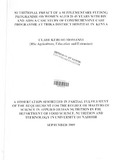| dc.description.abstract | Malnutrition contributes to morbidity and mortality in HIV infected persons. In HIV,
malnutrition is different from simple starvation and requires targeted interventions, which are meant to halt and reverse its impact on the infected and disease process and progress. One of those interventions is supplementary food programme like the Food by Prescription. The objective and purpose of this study was therefore to determine the nutritional impact of supplementary food intervention programme on HIV positive women. The sample consisted of 66 HIV positive women between the ages of 20-49 years receiving the Food by Prescription supplementary food at the Thika district hospital comprehensive care clinic. Data were collected using structured questionnaires, focus group discussion, key informant interviews and anthropometric measurements, which were weight and height. Proximate analysis was for the food that was used in the study was carried out at the at the Kenya Bureau of Standards laboratory. Data entry, cleaning, management and analysis was done using the statistical package for social sciences software (version 12.0.1) Data were analysed by simple descriptive statistics, correlations and tests of quality of means. Results showed that 39% of the clients complied by consuming the full amount (9000g) of the supplement issued which lead to a relatively higher body mass index monthly increases compared to those who consumed less. Those who consumed 6000g of the supplement accounted for 48%, while 13% consumed 4500g. The respondents who had stayed in the programme for one to three months had a higher body mass index monthly increases compared to those who had stayed for longer than three months. Those who had stayed for more than six months had the least BMI increment per month. The food supplement ration supplied to the HIV positive women when fully consumed improved nutritional status as required. The factors that influence the sharing of the food is household food insecurity. Other factors are the supplement acceptability, which was evaluated through the organoleptic properties of the supplementary food and using it as a tool to encourage other people who are HIV positive to attend the comprehensive care clinic. The current three-month period of supplementation is adequate only when other strategies are in place that will improve their income status. This will play a role in improving their nutritional status thus ensures that they continue meeting their nutrient requirements, which they lacked before joining the programme. | en |

